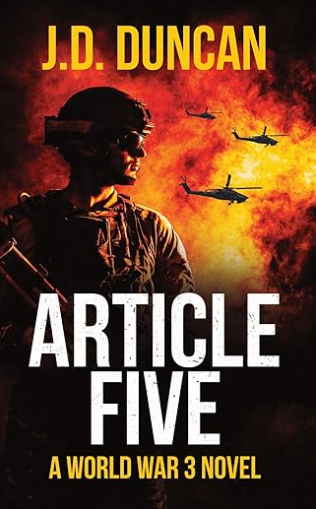Article Five: A World War Three Novel Book Review

by J. D. Duncan
I was very happy to get a review copy of Article Five just before the recent release and I’m looking forward to telling you more about it.
Genre: Geopolitical / Military Thriller
Release: September 7
Mood: High-stakes, propulsive, plausibly terrifying
A newly elected U.S. president deserts NATO, Russia invades Estonia, and Europe is forced to fight for its survival in Article Five’s hypothetical match-strike scenario that may realistically set the world on fire. J. D. Duncan creates a fast-paced, multi-theater drama about deterrence failing in real time—and the violent improvisation that ensues—from Whitehall briefing rooms to the icy North Atlantic and an armored spearpoint on the front.
What works (really well)
- A panoramic battlefield without losing the human pulse. Duncan uses overlapping points of view to organize the book: Sergeant Johnson in the mud and fire at the armored edge, Commander Anderson aboard HMS Daring maintaining lifelines, and MI6 agent John Rafferty on a manhunt in London. The cutaways are not interruptions but rather cliffhangers, and each plotline has unique tactical textures and stakes.
- Clancy-level plausibility with modern pacing. The military problem-sets are tangible, the solutions have repercussions, and the politics feel brutally plausible, so fans of Tom Clancy, Mark Greaney, and Frederick Forsyth will feel right at home. Chapters also flow quickly, with exposition condensed to what you need at any given time.
- A thriller that understands Article 5. The mutual-defense provision of NATO is not treated as a catchphrase in the book. Under pressure—legal barriers, political hesitancy, and the somber math of commitment—it handles it like a decision tree. The story has teeth because of that nuance.
Characters worth following into the fire
- John Rafferty (MI6): When his search for a Russian defector turns into an urban conflict, the issue becomes not just who to believe but also how to behave when the streets of London turn into battlegrounds. Rafferty’s storyline examines loyalty on both a personal and professional level—how far a spy will go when the lines are blurred.
- Commander Anderson (Royal Navy): The nautical thread is excellent. White-knuckle naval chess involves escorting critical supply lanes while enemy warships investigate and threaten. Anderson makes important decisions about whether to risk, when to bluff, and when to use up valuable capability.
- Sergeant Johnson (Armor): The pulsating heart of the book. The ground fact that maintains the integrity of geopolitics is the humor and fear of his tank crew, the weariness and small wins, and the way ideology clashes with reality.
- The traitor in the tall grass: Duncan uses clever misdirection and subtle clues to establish this narrative. It’s the silent hand tilting the entire board, not a tacked-on twist.
Stakes, tension, payoff
Just as much anxiety is created by logistics as by firefights. Every chapter uses resources that are difficult to replace, such as fuel, time, bandwidth, and political capital. A frantic London operation, a nerve-wracking naval intercept, and a desperate armor engagement are all excellent set pieces, but the novel really shines in the aftermaths, as decisions reverberate and characters carry their actions into the following chapter.
Craft & readability
Duncan writes with the confidence of someone who has completed the assignment without flaunting it. A rare and pleasant achievement in military fiction, the action is spatially obvious, the topography is depicted with just enough detail to anchor you, and acronyms are introduced succinctly. The political sequences avoid the caricature trap, and the dialogue is sharp, particularly between the troops and sailors.
Worldbuilding & plausibility
The reason the “what-if” is so terrifying is that it is not implausible: a Washington policy shock, an opportunistic strike in the Baltics, and European capitals rushing to bring doctrine, capability, and public will into alignment. Alliances are complicated, vital, and only as strong as their weakest point, and the novel honors this fact. The suspense is increased by this realism: plot armor never makes you feel better.
Who it’s for
- Readers who devour Clancy/Greaney/Forsyth and want a contemporary, fast-cut update that still prizes authenticity.
- Thriller fans who enjoy multiple theaters of action—spycraft, naval warfare, and armored combat—woven into one converging crisis.
- Anyone curious about how Article 5 might play out when the clock is ticking, the airwaves are jammed, and nobody has perfect information.
Content notes
Political betrayal, civilian danger, and wartime savagery. The results are not sanitized, yet the book doesn’t dwell on gore.
Verdict
After each chapter of Article Five, you’ll be checking your phone, almost expecting a push alert that the fiction has just made the news. It’s the type of geopolitical thriller. It’s grounded, lean, and urgent—big idea stakes presented by people you can support when the world seems to be heading toward disaster. Give yourself a weekend; you’ll breathe this in.
5 stars from me!
